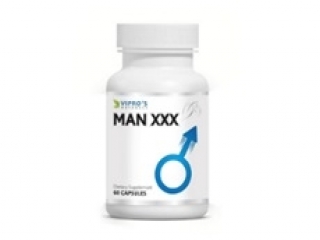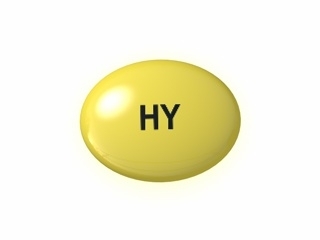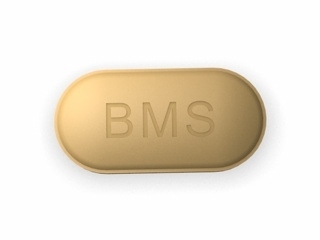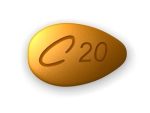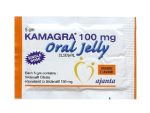Genital Herpes
Genital Herpes: Symptoms and Stages
Red dots, pimples on the head of the penis is it a fungus or a virus?
If you are worried about red pimples on the head of the penis and you have no idea what it could be … This article will help you figure it out. We hasten to reassure you – most likely, you just have a fungus – mycosis. And be careful, there is a high chance that your partner may become infected, so wear a condom during treatment.
Candidiasis (thrush) is a disease that many have heard of. Most often, it is called a female pathology, since the female body, due to its anatomical features, is more susceptible to the development of this disease. Candida Albicans is a fungus related to yeast.
Normally, it is detected in 80% of people and peacefully coexists with the body of its owner. It is present in the normal human microflora. If the body is healthy and the immune system is normal, microorganisms do not pose a threat to humans at all.
Pathological reproduction of candida in the body can begin when immunity is weakened due to certain reasons (diseases, taking certain medications), weakening of other microflora (associated with taking antibiotics), and non-compliance with personal hygiene rules during menstruation.
In other words, candida is only harmless to a healthy person and can « go over to the side of evil » at any moment.
Doctors usually find large amounts of Candida in warm, moist places on the body, including the mouth and especially the glans penis. The disease can be detected in every tenth man who, for certain reasons, seeks help from a dermatologist. Many do not pay attention to their health and continue to live at a normal pace, not paying attention to the symptoms of the disease. This is dangerous not only because of the risk of complications but also because such men pose a threat to their sexual partners: the simultaneous introduction of a large number of fungi into the woman’s vagina can also cause her illness.
This form of disease is the most common. It is with her that doctors have to deal with most often. Redness of the foreskin surrounding the glans penis, as well as the skin covering the glans penis.
The penis is sensitive to external stimuli, sometimes it hurts even at rest. Under the foreskin, discharge has a curdled consistency. Under the white film of discharge, inflamed red dots can be found. Itching in the region of the glans penis. An unpleasant odor may come from the penis.
Tingling, then cutting pain when urinating – a consequence of urine irritation of already inflamed tissues. At the initial stage, patients observe a small itchy rash, which gradually becomes more pronounced. The affected area of the skin gradually increases and over time becomes covered with a specific thickened discharge that has an unpleasant sour smell.
Since we are talking about local forms of the disease, when small areas are affected, it is better to treat a man in such cases with local preparations. A Canadian pharmacy sells fairly effective ointments and creams containing antifungal drugs (Clotrimazole, Nizoral, Ketoconazole, Miconazole, Econazole) and Diflucan tablets (fluconazole), Fulvicin (griseofulvin). They can be purchased without a doctor’s prescription, but you should always consult a specialist first.
Some patients feel a burning sensation in the affected area of the skin when using the cream. If this symptom is mild, treatment can be continued. Severe burning and irritation is a signals to stop using the cream and change the drug. If 2 weeks have already passed, and the symptoms of the disease have not disappeared, you should contact a dermatologist to correct the treatment.
Prevention of mycoses, genital candidiasis
The best treatment is disease prevention. So, by following a few simple rules, you can avoid big troubles.
- Carefully follow the rules of personal hygiene. Wash your genitals daily with warm soapy water.
- The genitals should always be kept clean, and try to avoid excessive moisture (wipe the penis after urination, do not wear wet underwear).
- Control blood sugar levels (diabetic patients), which will prevent frequent recurrences of the disease.
- Eating enough vegetables and fruits, and maintaining a healthy lifestyle – will ensure the normal functioning of the immune system.
- Be especially careful when having sex – be sure to use a condom.
- The disease successfully develops in the body with reduced immunity, as well as when taking various antibiotics.
It is important to note that although it is possible for a woman to contract thrush without sexual contact, in men the most common route of infection is through sexual intercourse with a woman already infected with Candida. The symptoms are easy to identify with an external examination. First, the skin in the groin is very itchy. There was a slight redness and a white spot on the head of the penis. At the time of urination and ejaculation, painful sensations occur.
If all the symptoms match, it is better to contact a urologist, who, after taking a smear, will be able to establish the final diagnosis and, if necessary, prescribe a remedy for the treatment of thrush. You can not let the disease take its course, as complications such as persistent acquired phimosis or erysipelas of the penis may develop.
Avoid casual sex. And if your partner has a fungal infection, be sure to use protection during sex.
Genital herpes in men
Genital herpes in men is one of the most common clinical types of herpes infection (STD) and differs from it in the lifelong carriage of the pathogen in the human body. The causative agent of genital herpes in men in 76% of cases is the herpes simplex virus type 2 (HSV-2). Cases of genital herpes caused by HSV type 1 are known, reflecting an increase in oral-genital contacts.
Genital herpes in men is characterized by the appearance of characteristic rashes on the skin and mucous membranes of the genitourinary and/or anal area. Herpetic blisters affect the mucous membranes of the urethra, genitals, and anus. The skin rash is in the form of red spots and small blisters after an incubation period of 2 to 4 days. Genital herpes is accompanied by a period of increased local clinical symptoms (tingling, burning), in some cases – general symptoms (malaise, weakness, fever). Genital herpes in men disappears without a trace on the 8-10th day.
The sexual route is the main one in the process of transmission of the genital herpes virus in men. The virus is also transmitted through oral-genital contact. The condition for the transfer is that you or your partner have a history of herpes of the lips or the presence of rashes in the lip area.
HSV enters the body through mucous membranes or damaged areas of the skin, where it multiplies. Most often it is the head of the penis or the area around the anus. At the same time, regardless of the symptoms of genital herpes in men, the virus penetrates into sensitive and autonomic nerve endings, then into the body of the neuron, into the ganglion, and continues to multiply there. It then spreads to the skin along peripheral sensory nerves, which explains the involvement of new surfaces located at a distance from the site of the primary localization of the vesicles. Genital herpes of the foreskin is the most common site for the appearance of rash elements.
Genital herpes in men is clinically manifested by red spots or dots followed by the appearance of painful blisters in the infected area.
Herpes and genital mycosis: how to distinguish?
Unlike a fungal infection, intimate herpes has a number of alternating symptoms:
- burning, itching, tingling,
- general intoxication (fever, malaise, chills, etc.),
- the appearance of edematous erythema,
- the appearance of blisters and swelling,
- scab formation,
- recovery, unstable pigmentation.
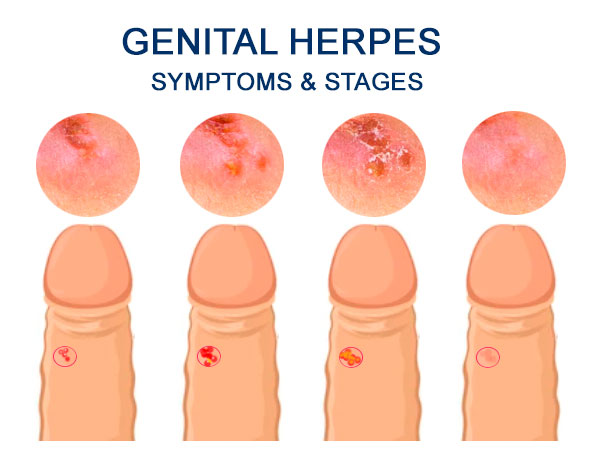
Sexual intercourse with genital herpes
During the active phase of the disease, it is worth abstaining from sexual intercourse. If you have genital herpes, you should tell your sexual partner about it. It should be remembered that barrier contraception and emergency prophylaxis cannot provide 100% protection against infection.
How to treat genital herpes in men?
Antiviral drugs effective against herpes include drugs such as acyclovir, as well as its more effective second-generation derivatives: Valaciclovir, Valtrex, Famciclovir, and Penciclovir. These drugs have clinical efficacy, and contribute to the rapid and effective reduction of the severity of symptoms, and subjective sensations, but cannot completely cure the infection.
Aciclovir and its analogs act only on the active herpes virus but do not act on latent viruses. A common disadvantage of preparations containing acyclovir is the inability to prevent recurrence of the disease and infection with a related type of virus. Antiviral drugs are used episodically in short courses of 5 to 10 days.
With herpes, the use of local antiviral agents is possible. This contributes to a significant reduction in the time of appearance and regression of rashes due to the high bioavailability of active substances at the site of injury. In the presence of resistance to drugs containing acyclovir, antiviral drugs with a different mechanism of action (foscarnet, panavir, aloferon) are used.
Pink dots on the penis are the first symptoms of infectious inflammation, and if left untreated, they can lead to complications and a more serious condition: balanitis or urethritis.
